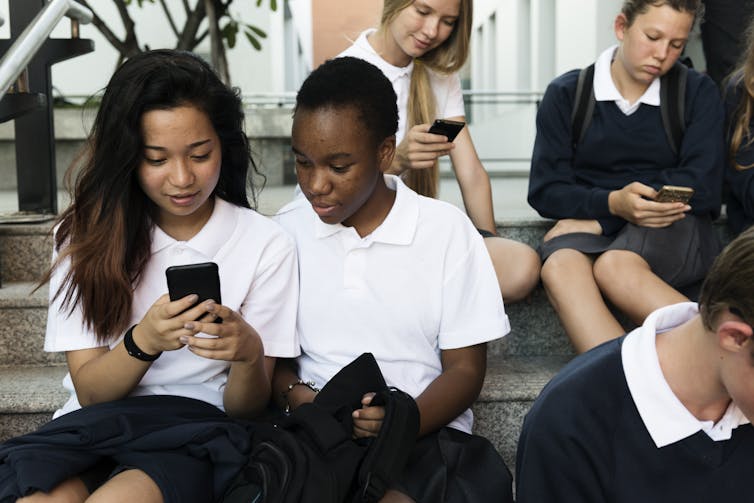Most children in the UK own their own phone by the age of 11. In China children get their first phone at an even younger age, with 88% of first to third-grade pupils (aged six to nine) reported to have their own smartphone .
If children have their own phone, they may well take it to school with them – perhaps encouraged to do so by their parents for safety reasons. For schools, though, mobile phones can be seen as a source of distraction. In France, mobile phone use is banned during school hours. However, research with teachers in China has found that banning phones at school is difficult to enforce.
Another approach could be the adoption of school policies – rules or guidelines – that accept the inevitability of phones in schools. Our recent research suggests that pupils, even in primary schools, may have the maturity to contribute to the development of appropriate policies.
Some research has found that banning mobile phone use can enhance students’ academic performance, especially for pupils from disadvantaged backgrounds. But this has not been consistently found in other research studies.
One reason for the inconsistency in research findings is that studies have focused on different age groups and little consideration has been given to children’s maturity and academic motivation. This is important, as older children might be able to use their phones more appropriately.
For example, 18-year-olds have been observed to only use their phones during the “in-between” spaces in the classroom, such as at the beginning and end of a class or when waiting for instruction. Furthermore, this phone use tended to be a solitary activity and therefore did not distract from learning. But it seems unlikely that younger teenagers or children would behave in the same way.
Benefits of mobile devices
On the other hand, rather than considering mobile phones a distraction, they could be used to increase pupils’ engagement in learning. A Bring your Own Device initiative trialled in New Zealand secondary schools, in which pupils were encouraged to bring their smartphones and tablets to use in class, found that their digital skills were improved and that there were increased opportunities for collaboration between pupils and between pupils and teachers.

Rawpixel.com/Shutterstock
Instead of banning phones outright, schools could consider introducing mobile phone use policies which develop children’s digital skills and resilience by teaching them about the benefits as well as the risks of mobile phone use. In addition to reducing possible distractions to learning, these policies could be used to encourage appropriate mobile phone use. This might be particularly important for younger children who may be less able to regulate their use of phones appropriately.
Consulting with children
Taking the views of those most directly involved with the policy – teachers, pupils and parents – into consideration is important. Teachers must enforce the policy, children are the intended beneficiaries of the policy and the views of parents are likely to influence their child’s compliance with the policy.
In our research at Staffordshire University we carried out paired interviews with parents and their ten or 11 year-old children. First, they were asked for their views on the benefits and risks of mobile phone use at school. Secondly, a range of different school mobile phone policies were shared with them and they gave their views on these.
The findings suggest that the children and their parents shared the view that phones were important for keeping in contact. They were also aware of the downsides of having phones at school, including bullying and risks of being able to access the internet. Neither parents nor children were supportive of policies involving total bans.
We found that the children contributed to the discussions in a very mature way, sometimes surprising their parents in how aware of the risks they were. Furthermore, in collaboration with their parents, they were able to come up with ideas for ideal policies and solutions to help enforce them. They demonstrated good awareness of appropriate and inappropriate use of mobile phones at school. One parent-child pair suggested a role of “telephone prefect” who would have a class mobile phone that children and parents could use to contact each other during the school day when necessary.
Involving children and parents in policy development has the potential to increase the effectiveness and enforceability of policies – and may even reduce children’s problematic phone use more broadly. Consulting with parents and pupils when developing school mobile phone policies is already recommended in Ireland.
School policies that ban mobile phones in schools may be missing an opportunity to involve children and educate them about responsible mobile phone use.